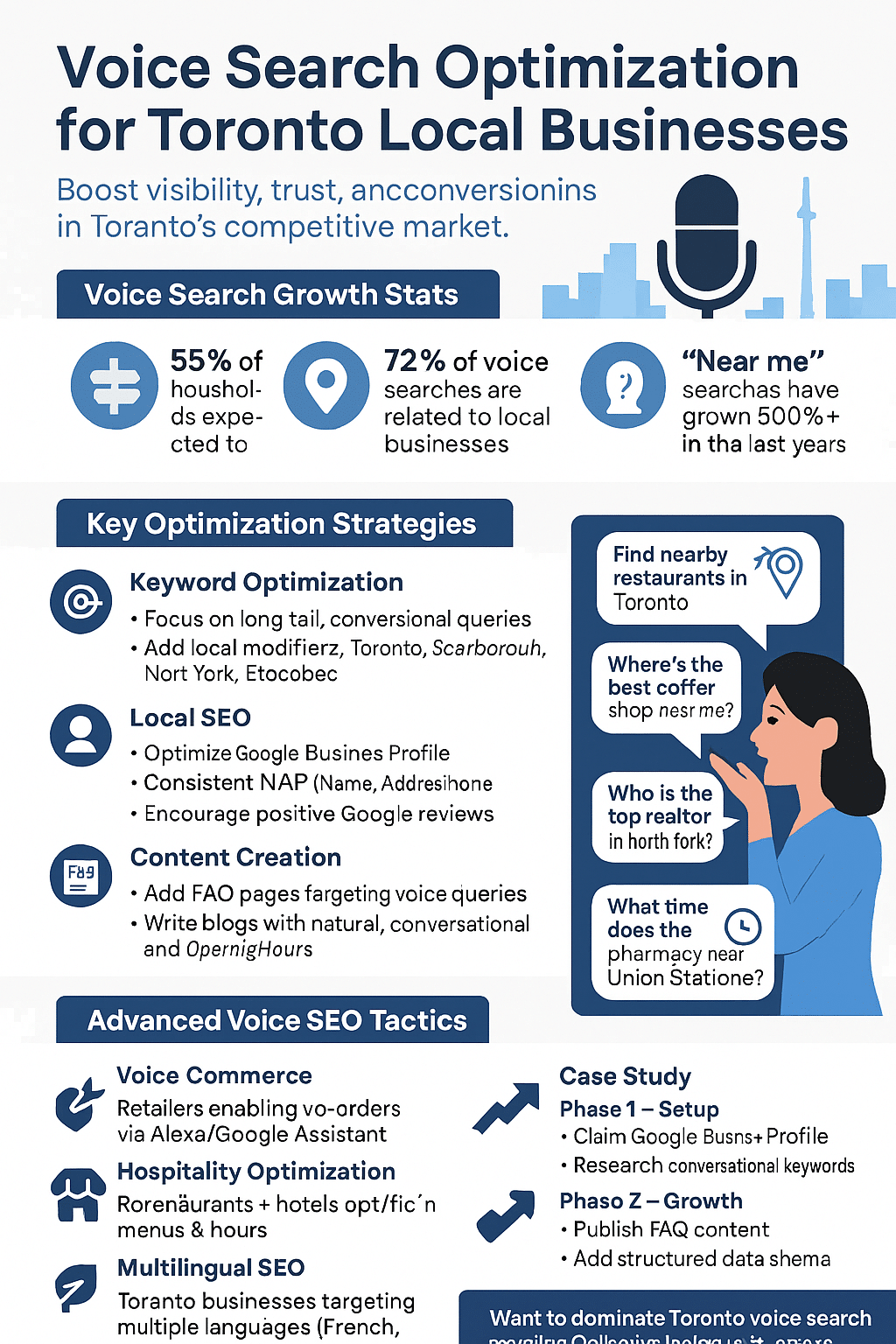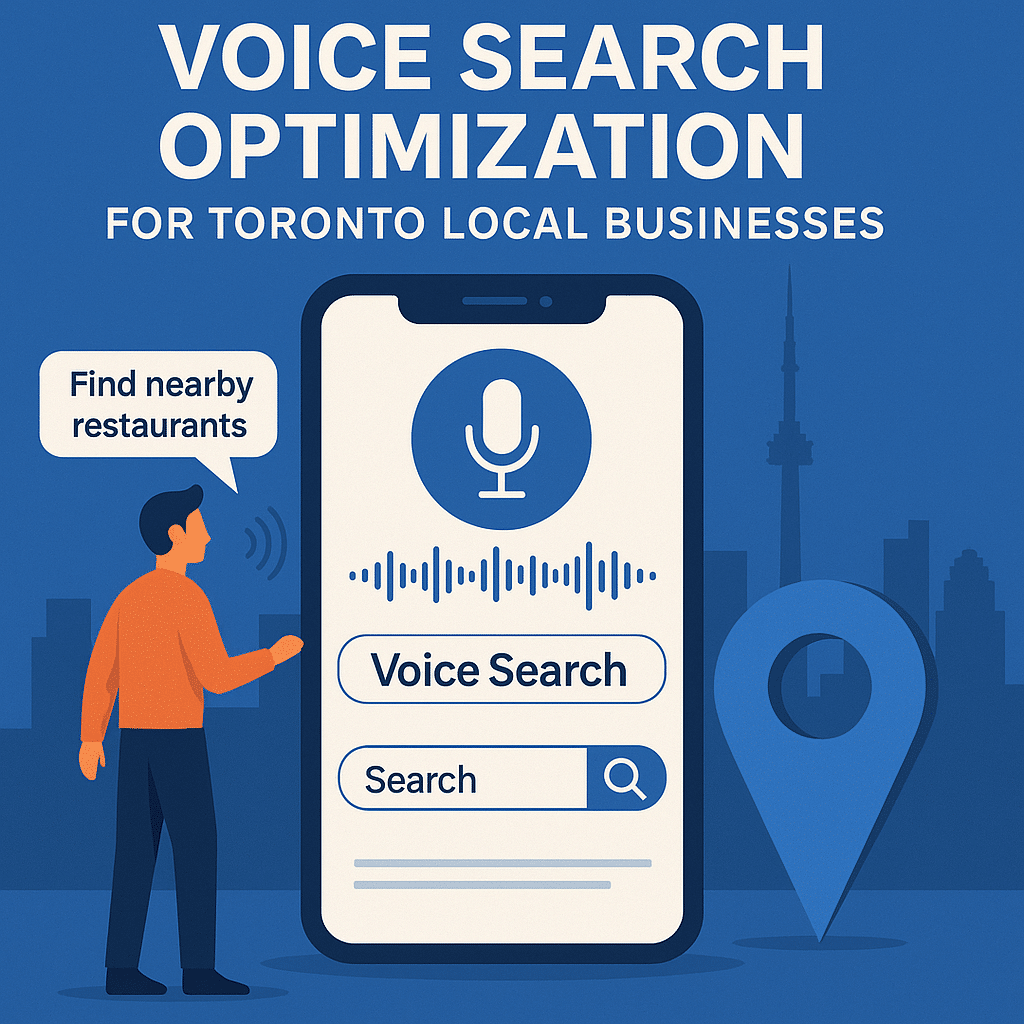The Rise of Voice Search in Toronto
Voice search has transformed the way consumers interact with businesses. In Toronto, where local businesses compete for visibility in one of Canada’s most dynamic urban markets, optimizing for voice queries is no longer optional—it’s a necessity. The rise of smart assistants like Siri, Google Assistant, and Alexa has shifted how customers search for local products and services. Phrases such as “Where’s the best coffee shop near me?” or “Find a plumber open now in Toronto” dominate voice search activity.
For Toronto local businesses, adapting SEO strategies to align with this shift can mean the difference between appearing in voice-powered results or losing customers to competitors. This article explores in depth how local businesses in Toronto can optimize for voice search and gain a competitive edge.
Why Voice Search Optimization Matters for Toronto Businesses
1. Growing Adoption of Smart Devices
Toronto residents are increasingly using voice-enabled devices. From smartphones to smart speakers, voice search has become an integral part of daily routines—whether booking reservations, finding directions, or locating services nearby.
2. Local Search Intent is Higher with Voice
Most voice searches are hyper-local. When someone asks, “Where is the nearest dental clinic in Toronto?” they’re ready to act. This makes voice search optimization particularly powerful for local businesses that thrive on immediate conversions.
3. Competitive Edge in a Saturated Market
Toronto’s local business landscape is competitive. Voice search optimization helps businesses stand out in featured snippets, Google’s Local Pack, and “near me” results, driving highly qualified leads.
Understanding Voice Search Behavior in Toronto
1. Conversational Queries
Voice searches are more conversational compared to text searches. Instead of typing “Toronto hair salon,” a user might say “Which hair salon in Toronto has the best reviews?”
2. Question-Based Searches
Voice queries are structured as questions:
“Who is the best real estate agent in Toronto?”
“What time does the closest pharmacy open?”
“How do I get to the nearest coffee shop in Yorkville?”
3. Mobile-First Usage
Since most voice searches happen on mobile devices, businesses must prioritize mobile optimization to ensure seamless customer experiences.
Core Voice Search Optimization Strategies for Toronto Businesses
Keyword Research for Conversational Phrases
Traditional keyword strategies must evolve. Voice queries are longer and more natural. Businesses should focus on:
Long-tail keywords: “Where can I buy vegan groceries in downtown Toronto?”
Question keywords: “What’s the best Italian restaurant near Union Station?”
Local modifiers: Including neighborhoods like Yorkville, North York, Scarborough, and Etobicoke.
Optimizing for Featured Snippets
Voice assistants often pull answers from Google’s featured snippets. To capture this:
Use structured content with direct answers.
Include FAQ sections with concise responses.
Format content in lists, tables, and bullet points.
Local SEO Enhancement
Claim and optimize Google Business Profile with up-to-date information.
Ensure NAP consistency (Name, Address, Phone) across all listings.
Collect and respond to Google reviews, as positive sentiment influences local voice search rankings.
Add service-specific keywords: “Toronto emergency plumber,” “Queen Street West yoga studio,” “Kensington Market brunch.”
Content Marketing Tailored for Voice Search
1. FAQ Pages
An FAQ page directly targets the types of questions asked in voice searches. Example:
Q: Where can I find a reliable electrician in Toronto?
A: Our licensed electricians serve downtown Toronto, North York, and Scarborough with same-day service.
2. Blog Content with Conversational Tone
Local businesses should create blogs that answer common community queries:
“What are the best pet-friendly restaurants in Toronto?”
“How to choose the right moving company in Toronto?”
“Top things to do in Toronto during winter.”
3. Hyper-Local Content
Focus on Toronto-specific neighborhoods and landmarks:
“Top brunch spots near Trinity Bellwoods Park.”
“Best gyms in North York for families.”

Technical SEO for Voice Search Success
1. Mobile Optimization
With most voice searches coming from smartphones:
Implement responsive design.
Ensure fast load speeds (under 3 seconds).
Optimize images for minimal lag.
2. Structured Data and Schema Markup
Use LocalBusiness schema to provide Google with detailed business data.
Implement FAQ schema for better chances of voice result features.
Add OpeningHours schema for businesses like restaurants, clinics, and gyms.
3. Page Speed and Core Web Vitals
Google prioritizes fast, secure, and user-friendly websites. Core Web Vitals (LCP, FID, CLS) directly influence rankings in both traditional and voice search.
Advanced Voice Search Tactics for Toronto Businesses
1. Voice Commerce for Retail Businesses
Toronto retailers can integrate voice commerce capabilities. Example: allowing customers to reorder products via Alexa or Google Assistant.
2. Voice Search for Restaurants and Hospitality
Restaurants, cafes, and hotels should optimize menus, pricing, and location queries. Example: “Find the best sushi restaurant in downtown Toronto open now.”
3. Multilingual Voice Optimization
Toronto is one of the most multicultural cities in the world. Businesses should optimize for multilingual voice search in languages such as French, Mandarin, Punjabi, and Spanish.
4. Integration with Smart Devices
Businesses like fitness centers, delivery services, and retail shops can create voice apps/skills for Google Assistant and Alexa to expand accessibility.
Case Study: A Toronto Restaurant Leveraging Voice SEO
A popular Toronto restaurant in Kensington Market saw a 70% increase in reservations after implementing voice search optimization.
They targeted queries like “Where can I find vegan brunch in Toronto?”
Optimized their Google Business Profile with updated menus and hours.
Added an FAQ section about dietary restrictions.
Secured positive reviews highlighting “best vegan food near downtown Toronto.”
Result: Their restaurant became the top choice in voice-powered search results for “vegan brunch Toronto.”
Voice Search Mistakes Toronto Businesses Should Avoid
Ignoring long-tail keywords in favor of short, generic terms.
Failing to maintain Google Business Profile accuracy.
Using overly formal content instead of natural, conversational language.
Neglecting review management, which reduces credibility.
Overlooking mobile site performance, leading to higher bounce rates.
Practical Roadmap for Voice SEO in Toronto
Phase 1: Research and Setup
Conduct local keyword research with a voice-first approach.
Optimize service pages with conversational headings.
Claim and optimize Google Business Profile.
Phase 2: Content Development
Build detailed FAQ pages.
Create local blogs targeting neighborhood queries.
Add structured data for services, reviews, and FAQs.
Phase 3: Growth and Expansion
Encourage multilingual reviews and optimize in multiple languages.
Develop voice apps/skills for Alexa and Google Assistant.
Integrate voice search capabilities in e-commerce or booking systems.
Conclusion: Dominating Toronto’s Local Market with Voice SEO
Voice search optimization is no longer a futuristic concept—it’s here and reshaping how Toronto consumers discover local businesses. By focusing on conversational keywords, local SEO, mobile optimization, and structured data, Toronto businesses can secure top positions in voice-powered results.
Those who adapt early will not only capture more local traffic but also build long-term credibility in one of North America’s most competitive markets. For Toronto businesses aiming to scale, voice search optimization is the ultimate growth lever.


